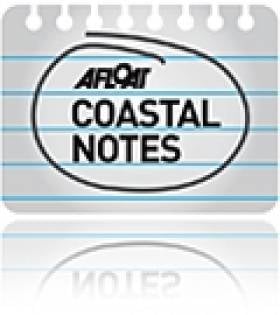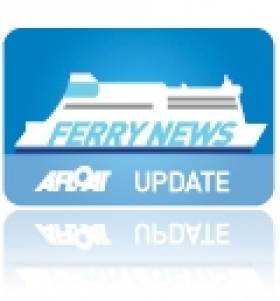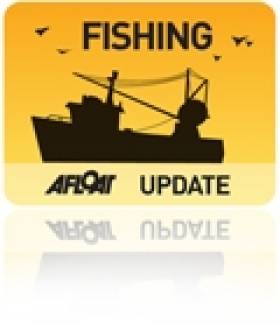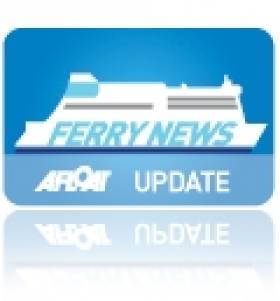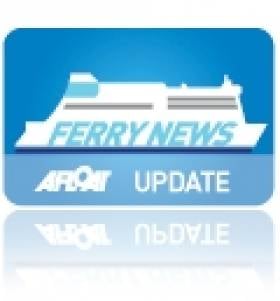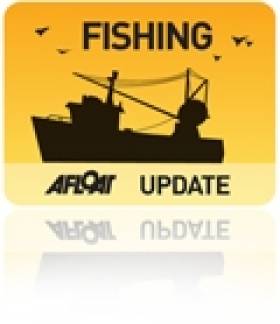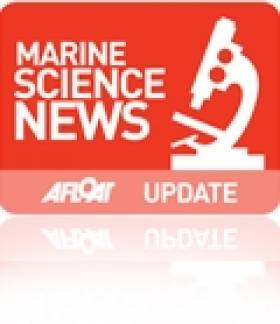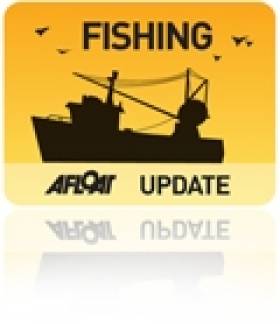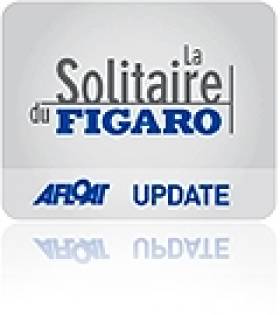Displaying items by tag: Celtic sea
South Coast Oil Appraisal 'Extremely Encouraging'
#COASTAL NOTES - Providence Resources has found light out with its first appraisal well off the south coast of Ireland, Offshore reports.
The company's semi-submersible GSF Arctic III drilled a well in 100m water to a depth of more than 2km on its Barryroe structure in the north Celtic Sea.
Indications of hydrocarbons were noted during the drilling, and further tests have confirmed the presence of 12.5m of 'net pay' (the thickness of rock that can deliver oil at a profitable rate) with as much as 87% hydrocarbon saturation.
The next stage will be a well flow test programme to determine whether future oil extraction can proceed.
“The confirmation of high quality light oil within a porous and potentially laterally extensive sandstone system is extremely encouraging," said technical director John O'Sullivan.
As previously reported on Afloat.ie, plans by Providence Rescources to prospect for oil pn the east coast off Dalkey Island have been met with fierce opposition by mainland residents and environmental groups.
Offshore has more on the story HERE.
Marine Notice on Pipeline Survey in Celtic Sea
#NEWS UPDATE - The latest Marine Notice from the Department of Transport, Tourism and Sport (DTTAS) advises on a pipeline survey in the Celtic Sea next month.
PSE Kinsale Energy Limited will be commencing the survey of the 24" Gas Export Pipeline on 6 March 2012 using the Marine Institute vessel RV Celtic Voyager (call sign EIQN). The survey is expected to last 1 to 2 days, depending on weather conditions.
The survey will take place along the existing pipeline route in the Celtic Sea, between the shoreline at Inch Beach in Co Cork and gas platform 'Alpha'.
The RV Celtic Voyager will display appropriate lights and signals, and will be towing side scan sonar with cables of up to 200m long. A Radio Navigation Warning will be issued via the Irish Coast Guard (schedule Bravo, four times a day) prior to the vessel's arrival at the survey area. The vessel will also keep a listening watch on VHF Channel 16.
All vessels, particularly those engaged in fishing, are requested to give the RV Celtic Voyager and her towed equipment a wide berth and keep a sharp lookout in the relevant areas.
Further details for seafarers, including relevant co-ordinates, are included in Marine Notice No 7 of 2012, a PDF of which is available to read and download HERE.
Cork-Swansea Ferry Firm Must Secure €1m
#FERRY NEWS - The operators of the Celtic Sea ferry route between Cork-Swansea need to secure over €1m in investment today in order to save the company after being thrown a €300,000 funding lifeline by Cork's local authorities.
Cork City Council agreed last night to invest €100,000 in the Fastnet Line, bringing its total investment in the company to €365,000.
It followed a 90-minute behind closed doors presentation by Fastnet Line's acting chief executive officer, Pádraic O'Kane. He is due to meet Enterprise Ireland this morning to discuss further investment. He declined to discuss the amount involved, but it is understood to be in the region of €400,000.
Finance Wales will await the outcome of those talks before it agrees to pump up to €800,000 in to the firm. For more about this story in today's Examiner click HERE
Minister Shows Displeasure With Euro Fishery Plans
#FISHING - The Minister for the Marine has spoken out over plans by the European Commission to make cuts in certain fish stocks that could see €65 million in lost earnings for Ireland's fishing fleet.
According to The Irish Times, Minister Simon Coveney said there was "very credible data prepared by the Marine Institute to back up" the case against proposals by EU maritime affairs commissioner Maria Damanaki to cut certain stocks by as much as 25%.
He told the paper he would "challenge anyone to say we are not sticking with scientific advice", and also suggested that the fishing industry is being more responsible in its own proposals.
"The European Commission is recommending a 60 per cent increase in the total allowable catch for Celtic Sea herring, whereas the industry is seeking 30 per cent as a more responsible approach,” said Minister Coveney.
“So this shows it is not true to say that fishermen are irresponsible, as some would suggest."
EU fish talks continue today in Brussels. The Irish Times has more on the story HERE.
Restructured Fastnet Line Reduce Year Round Service to Seasonal Schedule
The discontinued winter sailing schedule for this year is also expected not to be repeated during October 2012-March 2013. Fastnet Line's decision to make the Celtic Sea route into a shoulder season and summer only service follows a similar path taken by Stena Line which withdrew Dun Laoghaire-Holyhead (HSS) sailings in mid-September, for report click here. The central corridor route is due to reopen sometime in April or May 2012.
Cork City and County council and Kerry County council have provided €700,000 to support Fastnet Line and yesterday they announced an additional €150,000 in co-funding for the period of the examinership. In order to stabilise finances the ferry company are to radically reduce passenger capacity of the Julia (see photo) from 1,500 down to 950. This is in line with the capacities of the Julia serving 'night' sailings.
She has a crew predominately from Eastern Europe and Irish and UK deck officers. The Bermuda flagged, Hamilton registered vessel is currently berthed at Ringaskiddy Ferry Terminal, Cork Harbour. At 154m she is the largest ferry to date capable of berthing in the limited confines of the swing basin in Swansea and with a draft of 5.8m in a port which is subject to a large tidal range on the Bristol Channel.
Operating costs on the 10 hour service has been severely hampered by continuing increases to world oil prices. From the year 2010 to this year, fuel costs rose by 27% and almost 50% from the original budget of 2009. The company claims that each crossing amounts to €18,560 alone in fuel costs.
Fastnet Line to date has carried 150,000 customers, of which 75% have originated from the UK market, generating on average €350 per person (€40m approx) exclusive of fare and on-board spend. This crucial market is core to the success of the company's direct 'gateway' route to scenic south-west Ireland, with Swansea connected to the M4 motorway linking midland population centres and London. The operator claims a saving of 600km driving based on a round trip compared to using rival ferries running on routes to Rosslare from Pembroke Dock and Fishguard.
Since the reinstatement of the service in March 2010, after Swansea Cork Ferries pulled the Superferry (photo) off-service in 2006, the loss to tourism generated revenue on both sides of the Celtic Sea was estimated to be £25m per annum according to the Welsh Assembly and a similar figure recorded in the Cork and Kerry region.
The company also outlines the reduction in carbon emissions saved from operating the only direct service specifically connecting the regions of Glamorgan and Munster. Some 500,000 freight miles alone were saved in the Welsh region since the service started instead of using alternative route running from Pembrokeshire ports.
- Cork Harbour
- west cork
- port of Cork
- Celtic sea
- Cork City council
- Fastnet Line
- M.V. Julia
- M4 motorway
- Kerry
- Irish High Court
- Stena Line
- Ports and Shipping News
- cork harbour news
- Ferry news
- HSS
- Welsh Assembly
- Cork County Council
- Associated British Ports
- ABP
- Ringaskiddy Ferry Terminal
- M.V. Superferry
- SwanseaCork Ferries
- SCF
- Fastnet Line Group
- Kerry County Council
- HSS Dun LaoghaireHolyhead sailings
- Glamorgan
- Munster regions
- Bristol Channel
- Bristol Channel tidal range
- Swansea Port
- Irish tourism sector
- Pembroke DockRosslare
- FishguardRosslare
High Court Appoint Examiner to Cork-Swansea Operator
Mr Justice Peter Kelly appointed Michael McAteer of Grant Thornton interim examiner at a sitting of the High Court. Mr McAteer will present a progress report to the court on November 15.
The Fastnet Line companies are owned by the West Cork Tourism Co-Operative Society Limited, which was formed in April 2009. Over 400 members have invested funds in the venture which started in March 2010 following the closure of Swansea Cork Ferries which ran on the route until 2006.
Bass Fishing Permit Refusal is Welcomed
Environmentalists have welcomed the decision by the Minister for the Marine to refuse a permit for commercial sea bass fishing in the Celtic Sea, The Irish Times reports.
The Friends of the Irish Environment hailed Minister Simon Coveney's retention of the total ban on commercial exploitation of sea bass stocks.
Anglers are only permitted to keep two of such fish measuring more than 40cm in any 24-hour period.
There has been much opposition to the proposal by the Federation of Irish Fishermen to lift the ban on commerical bass fishing.
The species has been on the protected list for more than 20 years but this protection was only made permanent in 2006.
Ferry Operator Assists in Marine-Life Conservation Role
Fastnet Line which runs the Cork-Swansea port route on the Celtic Sea, is assisting the charity MarineLife to monitor cetaceans, writes Jehan Ashmore.
The work of MarineLife is to survey the population trends and track the movements of dolphins, whales, porpoises and other wildlife. The research is undertaken onboard Fastnet Line's Julia (1981/21,699grt) and access to the ferry is provided free-of-charge to the wildlife-based charity.
During the months of July and August the ferry's schedule will allow for further opportunities to conduct daylight sightings of marine-life which is to be posted on MarineLife and Fastnet Line websites.
Adrian Shephard, Chairman of MarineLife Trustees, said: "The route from Swansea to Cork crosses a range of marine habitats and we hope it will generate many sightings of cetaceans and seabirds, including two important species we monitor, the white-beaked dolphin and the balearic shearwater".
In addition monitors recently observed fin whales, the second largest whale on the planet. Such sightings provide vital information and this will contribute to a better understanding of the distribution of cetaceans and other marine life in the Celtic Sea. To read more www.marine-life.org.uk
The first of four summertime surveys is to take place on 10 July. Overall the research by MarineLife is part of a larger project which also involves the use of other ferries operating in the Irish Sea and those serving on UK continental routes.
The 1,500 passenger / 325 car-carrying Julia sails year-round six times a week between September to June and from next month and during August the vessel will provide eight sailings per week. For fares and sailings schedules contact www.fastnetline.com
Mr. Sean Connick, T.D. Minister of State at the Department of Agriculture, Fisheries and Food welcomed the agreement reached after two days of talks in Brussels on 2011 quotas for the Irish fishing fleet.
The final agreement will deliver whitefish quotas worth some €116 million, including the protection of Ireland's €54 million prawn fishery. There will be a 10% increase in quota for Ireland's €75 million mackerel industry and a two thirds share, worth approximately €4 million, for Irish fishermen of the new boarfish industry.
Speaking at the end of the negotiations in the early hours of Wednesday (16 December), the Minister said
"The negotiations have been particularly challenging this year with the European Commission proposing cuts across many stocks of commercial importance for Ireland. Consulting with our fishing industry and NGOs, working with other Member States and concentrating on the scientific evidence, was, I believe key to securing a balanced sustainable package."
"This package will help underpin the economic future of our costal communities."
There will be 15% increase in haddock and whiting stocks in the Celtic Sea. While for the cod stocks off the North West and the Irish Sea, the quotas will be reduced by 25% in line with the Recovery Plan for these stocks. For Celtic Sea cod, the current quota level has been maintained for 2011 on the basis of new survey results from the State's Research Vessel "Celtic Explorer".
Minister Connick commented "By introducing new information on Celtic Sea cod, I secured agreement that the current level of TAC will continue into 2011, and may be increased during the year if the new survey results are confirmed by the scientists. However, given the poor state of cod stocks off the North West and in the Irish Sea, cuts were necessary".
Commenting on the 3% reduction in the prawn quota, the Minister said "Prawns are a very important fishery all around our coast. It is the most valuable catch for the Irish whitefish fleet worth €54 million. While the Commission originally proposed a 17% cut, I secured just a 3% decrease in the quota on the basis of a strong scientific case."
The quota for mackerel will be increased by 10%, and should be worth up to €75m in 2011. This is the most important fishery for the North West fleet based in Killybegs and is also important for the South West multi purpose fleet, supporting processing jobs in the coastal communities.
There were also increases in the quota for Celtic Sea herring of 30%, although there were cuts in the North West stock reflecting concerns about the state of those stocks.
Finally, Ireland secured the largest share in an important new fishery for boarfish that will be worth just under €4 million in 2011. The Irish fishing industry has been working with the scientific community to develop a management plan for boarfish, a mid-water shoaling species, now found in large volumes off the South West coast. The agreement reached in Brussels provides for a total allowable catch of some 33,000 tonnes, with two thirds going to Ireland.
Minister Connick commented "In an example of a successful investment in scientific research by industry, we have opened up a new fishery and secured the major stake in that industry. This ensures a new revenue stream for Irish industry into the future. We believe we can now develop a significant and sustainable fishery on this stock, in which we will continue to hold the largest share".
Solitaire du Figaro: Irish Coast Beckons
The first night at sea of Leg 3 of La Solitaire du Figaro proved to be as demanding as expected, with the skippers fighting against high winds, cold weather, drizzling rain, fog and, especially, a very fastidious swell. Several blown spinnakers but the whole fleet is fastly sailing towards Ireland. After keeping the lead for more than 24 hours, Thomas Rouxel, has to lave first place to Armel Le Cleac'h. Yet, nothing is carved in stone as the first 26 boats are only 5 miles apart at 150 miles from the finish. Last night's Channel crossing from Portsal to Wolf Rock was wet and bumpy for the 44 skippers racing in the 41st edition of La Solitaire du Figaro. "Several skippers reported damages and breakages" said Jacques Caraes form the Race Management catamaran following the fleet's progress in the Celtic Sea. The big waves got the best of at least a dozen spinnakers.
Surely annoying but probably not so relevant for the rest of the race to Ireland because, in theory, the skippers will not need them to sail to Fastnet Rock and their final destination, Kinsale. The damage on Armel Tripon's Gedimat looks more serious, her hull pierced following a collision after the start in Brest. "On starboard tack there is a leak" reports Tripon, at the same time reassuring that the situation seems to be under control and keeps his spirits high. No doubt that shore teams, sail makers, riggers and builders will be busy over next week in Kinsale. For the sailors' joy the long, uncomfortable reaching in high winds up to 25 knots, grey and wet conditions came to an end early in the morning when the leaders rounded the Wolf Rock lighthouse and entered the Celtic sea. The first skipper to reach midpoint to the finish was a consistent Thomas Rouxel (Crédit Mutuel de Bretagne). The fleet later had to deal with a sudden 90° wind shift, provoked by the quick passage of a front, he wind from south westerly became north easterly. Sure enough there will be more of such variations to negotiate before seeing the famous Fastnet Rock, as confirmed by Meteo France's weather expert Sylvain Mondon: "the wind shifty and unstable, coming from the northern sector". No big news there, since before leaving Brest all the skippers declared that they very particularly wary of the Celtic Sea and its tactical tricks.
The tricky sea and hard tactical choices don't seem to be a major problem for Armel Le Cleach (Britair) who is reported to have got in the lead once again, overtaking Thomas Rouxel (Credit Mutuel de Bretagne) and preceding also Jean-Pierre Nicol (Bernard Controls) in third.
Yet the skippers are sailing in a very compact group, only 4.5 miles separate the leader from the 26th placed, Italian Pietro D'Alì (I.NOVA.3). Yet, another brilliant performance to register from Portuguese Francisco Lobato (ROFF/TEMPO-TEAM), who's been in the leading pack since the start and now lies in 12th position only two miles behind Le Cleac'h and first in the newcomers special ranking. Franco/German Isabelle Joschke (Synergie) is 25th, Swiss Bernard Stamm (Cheminées Poujoulat) is 35th and Jonny Malbon (Artemis) is in 42th at ten miles from the top. As per the latest computer simulations the ETA for the leaders at the Fastnet could be tomorrow between 9 and 12 GMT while the leaders could be crossing the finish line at Old Head of Kinsale. Quotes from the skippers:Corentin Douguet (E.Leclerc Mobile)"The wind shifted by 90° all of a sudden, it nearly got me by surprise. I had to tack quickly and now we are on port. We were heading to target on starboard before and we are doing in now on the opposite tack! We are approaching the Fastnet faster than expected, We've been busy since the start, no waiting game and it should be like that to the Rock, a tight schedule. It's windy but the swell is more annoying, rough and the autopilot is not working 1005 in these conditions. You must steer.
Typical August day in the Celtic sea. I't getting better, the visibility is improving, until a hour ago you can't see anything. Still, I like to be here." Armel Le Cléac'h (Brit Air)"After Brittany Point, a long tack and after rounding Wolf Rock there was a huge wind shift, more than 100°, from SW to NE, the breeze is coming from everywhere... The night was all right, I was happy to have left Brest in a good position, I was afraid of getting stuck somehow in the gulf. The sea is confused, we have a long stretch upwind tacking to the Fastnet, it won't be easy to find the best track to Kinsale. I keep my fingers crossed." Yann Eliès (Generali Europ Assistance)"A front just passed, the wind shifted abruptly but the rain has stopped and it's good after a whole night spent under, literally, buckets of water! You couldn't see much out there. I tried to go West and a cargo ship made a u turn just in front of me, I was obliged to take down the spinnaker. I lost some ground, even if I'm always in the top pack. There are still options to be made: a ridge, wind shifts, all the upwind part to the Irish coast that's going to be fun..."
Preparing for La Solitaire du Figaro here
Latest news for La Solitaire du Figaro here


























